- Home
- Peter Swanson
Her Every Fear Page 16
Her Every Fear Read online
Page 16
“Look, I don’t know if you should stay there. In the same building.”
“I think it will be fine,” Kate said. She suddenly wanted to leave. Sumera’s face, ever since they’d started talking about the murder, had been wide-eyed in alarm, and it was starting to make Kate nervous. “It was nice meeting you, Sumera. My neighbors invited me to their apartment tonight, so I should probably get going.”
“Maybe they’ll know more about what happened.”
“Maybe. I’ll see you back in class on Wednesday.”
“Okay. Are you walking to Porter T?”
She’d been planning on it, but Kate said, “I’ll probably walk to Harvard. I have some things . . .”
Sumera, finally sensing Kate’s discomfort, let her go, and Kate began the walk back along Massachusetts Avenue. The wind had lessened, but the sky was now entirely filled with clouds, so that the light seemed to blur. She wondered if she could walk the entire distance home; she was pretty sure that the wide, busy avenue that she was currently on extended all the way into Boston. But as she approached Harvard Square and spotted the T station, she decided that it was important she rode the subway again. It was only a few stops. Her panic earlier had had more to do with the sketchbook than with the claustrophobia of the train. And she’d be heading home this time, back to the relative safety of her apartment.
Without hesitating, she entered the subway station, weaved through a disembarking crowd, and got onto a nearly empty car. It was a much easier ride on the way back. She was anxious to get back and see what she could find out on the Internet about Audrey Marshall. She wondered if Sumera had even known what she was talking about. Was there genuine information out there about the nature of Audrey’s death? Before she knew it, she’d made it to Charles Street Station. On her walk home, she stopped for more provisions. Her next class was not until Wednesday, and she wanted to at least give herself the opportunity of spending all of Tuesday inside.
Back at the apartment, Kate climbed onto her bed and pulled her sketchbook from her backpack to take one more look at the sketch she’d done of Audrey’s friend. Maybe she’d overreacted on the subway earlier. But, no, looking at the drawing again it seemed significantly wrong, maybe even more so in the better light of the apartment. The eyes had completely changed.
Someone else drew those eyes. George’s voice again.
She tried to ignore him, flipped a page, removed a charcoal pencil from the pack, and quickly sketched Sumera, her round face and thick, unplucked brows, hair parted in the middle. She didn’t know how to spell Sumera, so under the picture she wrote, girl in graphic design class, cambridge, ma, and then the date. She flipped to another page and started to draw a new sketch of Jack Ludovico, but it wasn’t coming out right. She had lost confidence in what he looked like. She did something she rarely did, and sliced that page out with the razor blade she kept with her art supplies. She crumpled the page into a tight ball and threw it out.
She got off the bed and went to the computer, searching for any new information on the murder, but could find nothing. She even went to Reddit and tried to find out something there, but she could barely comprehend the Web site, let alone figure out how to navigate it.
She checked her e-mails. No response from Corbin, even after telling him that the police had searched his apartment.
At seven o’clock, after changing into a summery dress and a cardigan, Kate walked out of her apartment, down the stairs to the lobby, then up the stairs to the other side of the building. She wondered if maybe Carol Valentine or her husband would know something about the Audrey Marshall investigation. She assumed it would be part of the evening’s conversation.
As she rounded the corner onto the Valentines’ hallway—decorated on this side in a wallpaper of black and silver—Alan Cherney was coming out of his apartment, locking the door behind him. He turned, and Kate noticed he was holding a bottle of wine. She wondered briefly where he was going before realizing that he was probably invited to the Valentines’ apartment as well.
“I’m crashing your welcome party,” he said as she approached him.
“I didn’t bring anything,” Kate said, her eyes on the wine bottle. “I didn’t even think of it.”
“Here.” Alan held the bottle out toward Kate. “I’ve already blown my first impression on them, months ago. You bring it.”
“No, no,” Kate said.
“They only invited me because I ran into Carol in the lobby this afternoon, and I told her that I’d gotten to know you a little.”
“Is it going to be a big party? I thought it was just me having one or two drinks.”
“No, it’ll just be you, and maybe Mrs. Anderby who lives downstairs. And now me. I think it’s kind of a Bury Street tradition. All new tenants get invited to the Valentines’. I’m only bringing wine so I don’t come empty-handed, but they’ll serve martinis, and you’ll be expected to drink one.”
“Really?”
“They did when Quinn and I were invited over.”
“We should go in, don’t you think?”
“We should.”
Alan knocked and the door was opened by Mr. Valentine. He was a short man with beautiful white hair. Whether he’d always been short, or it was a function of his extreme old age, was hard to tell. He wore suit pants and a pale blue cashmere V-neck, and he beckoned them in with a long, thin silver spoon. “Olive or a twist?” he asked.
Kate, confused, thinking he’d said “Oliver Twist,” turned toward Alan.
“I’ll have a twist, please,” he said to Mr. Valentine, then turned to Kate, and asked, “Do you want an olive or a twist of lemon in your martini?”
“Oh, an olive, please,” Kate said, as Mr. Valentine turned and departed, just as Carol appeared. She was still wearing the wraparound white sweater she’d been wearing that morning, but her gray hair, which Kate had only ever seen up, was down, swept back off her forehead, and stiffly held in place by some sort of hair product.
“Come in, you two. Kate, what a lovely dress. Please excuse Bill. He doesn’t talk until he’s had his first martini of the night, and then you can never shut him up.”
They followed Carol into the elegant living room, the furniture mostly white and the walls papered in pale gold. Alan, as they followed, whispered to Kate: “She said the exact same words last time I was here.” As he whispered, their bodies bumped together, and Kate found herself glad that he had come as well.
In the living room, Bill Valentine was at a sidebar stirring a pitcher of martinis with the long spoon he’d held when he greeted them. Weaving between his legs was Sanders the cat, who stopped and stared at the new guests.
“Oh, Sanders,” Kate said.
“Is he in here?” Carol said, spotting him. “I’m sure he’s already tried to get into your apartment. You don’t have to let him, you know, if you don’t want to. He thinks the entire building is his house, and everyone’s his staff.”
“I haven’t met the woman who owns him,” Kate said.
Alan and Carol both said “Florence Halperin” at the same time.
“No one sees her,” Carol continued. “As far as I know, she doesn’t leave her apartment. Her groceries are delivered.”
“I’ve never seen her,” Alan said.
There was another knock on the door, and Carol said, “That must be Mrs. Anderby. Please excuse me.”
Left alone, Alan walked toward the bar to see if Bill Valentine needed any help, and Kate wandered farther into the opulent room. There was the sharp, unpleasant smell of lilacs, and Kate turned and spotted a large bouquet on a waist-high, marble-topped table. Above the table was a tall oil painting, a portrait of Bill and Carol that looked like it had been painted about twenty-five years ago. Bill was seated, and Carol stood behind him, a hand on his shoulder. They looked the same except for their hair, Bill’s dark and just beginning to be streaked with gray, Carol’s fully blond. Alan appeared beside her holding two martinis, one with a lemon twist and one with an
olive. He handed Kate her drink. Her hand shook a little, and the surface of the drink, poured right up to the lip of the glass, spilled over. Kate dipped her head and took a slurping sip of the ice-cold gin, some of which dribbled down her chin.
“God. I’m glad you were the only one to see that.”
Alan laughed, then turned as Carol came in with Mrs. Anderby, older than either Bill or Carol. She was short, with a slight dowager’s hump and hair that was thinning on the top, revealing her pink scalp. Carol introduced her to Kate, who was surprised by the firm grip of Mrs. Anderby’s plump hand.
“Yes, she is pretty,” Mrs. Anderby said.
“No,” Kate said. “It’s my name. It’s Kate Priddy. P-R-I-D-D-Y.” It was something she was used to having to explain.
“Oh, I see. Well, you’re also pretty, dear.”
“Thank you.”
It took a while, but eventually all the guests were settled in various seats around a white lacquered coffee table that held several small bowls filled with nuts and olives. Kate had finished half her martini, just to keep it from spilling, and she already felt the effects. She’d had plenty of gin, but never without tonic in it, and she decided that she liked this concoction, despite the little shivers she got every time she took a sip.
Bill Valentine was halfway through his martini as well, and explaining to Kate the history of the building they were in. “It’s the Italian courtyard that really sets this building apart from other similar buildings in the Flat of the Hill.”
“What’s the Flat of the Hill?” Kate asked.
“That’s our neighborhood—”
“Beacon Hill, really,” Carol said.
“No, not really. People say we live in Beacon Hill, but we’re not on a hill, are we? What we’re actually on is landfill that pushed the river back so they could create more housing. That’s why it’s flat.”
“Whatever it’s called, it’s the most beautiful neighborhood I’ve ever lived in,” Kate said.
Bill continued to tell Kate about the local history, including a long list of famous residents, none of whose names Kate recognized. Carol, meanwhile, grabbed Alan’s attention and began to talk with him and Mrs. Anderby. As Bill monologued on, Kate could hear snippets of the other conversation and realized they were talking about Audrey Marshall. She tried hard to stay interested in what her host was saying, but she kept straining to hear what Carol was saying—something about the incompetence of the police. There was about a half ounce of gin left in Kate’s glass, and she drank it down—it had warmed and now tasted harsher—and then ate her olive, hoping Bill would notice her empty glass and offer her a refill. His eyes flicked to her empty glass, and he swiftly finished his own. Kate asked him if he wanted another and began to rise, but he quickly stopped her and said he’d make them. He pushed himself with some effort up off the couch, and took both empty glasses back to the bar. Kate felt a pang of guilt, but she really wanted to hear what the others were saying. She slid along the couch so that she was closer to them.
Carol turned to Kate and said, “We’re talking about Audrey Marshall. I hope that doesn’t upset you. Nothing like arriving in America and finding out your next-door neighbor’s been murdered.”
“It’s officially a murder, then?”
“Oh yes, I think so.” Carol’s eyes darted from guest to guest for confirmation.
Mrs. Anderby, speaking in a deep, masculine voice, said, “Oh, it was murder. Sex crime, probably. It’s just not safe in the city anymore, even with a doorman. I told my son that I’ll have to hire a full-time dog walker for Scout because I don’t know if I can safely walk the streets. I don’t even recognize my own neighborhood anymore.”
“Lila, I don’t think these streets are any more dangerous now than they’ve ever been,” Carol said.
“Well, I just don’t know.”
“Has anyone heard anything about how Audrey Marshall was killed?” Kate asked. She was hoping to get some confirmation of what she’d heard earlier from the girl in her class.
“No, even Bob said he wasn’t sure, and if Bob doesn’t know . . .”
“With a knife, and she was mutilated,” Alan said, as casually as though he’d just revealed that the five-day weather forecast was looking good. All eyes turned to him.
Chapter 20
Mrs. Anderby actually placed a hand against her chest and gasped a little after what Alan had said. “Well, that’s what I read,” Alan continued. “Online.”
“Was it on Reddit?” Kate asked.
“No, it was in the comments section of a Globe article. I realize that doesn’t sound very reliable, and it probably isn’t, but one of the commenters said he knew the ambulance driver who took her to the morgue. He said it was the worst crime scene he’d ever seen.”
“Good lord,” Carol said.
“I heard the same thing today,” Kate said. “Not from online but from this girl in my class. She said she read it on Reddit. I don’t even know what that is.”
“Well, let’s hope that it’s not true,” Carol said. “If that gets out we’ll be absolutely swarmed with gawkers and reporters. It’ll be just like what happened over in Charlestown after the, after the . . .”
“Have they arrested anyone yet?” Mrs. Anderby asked, directing the question midway between Kate and Alan.
“No,” Alan said. “At least not that I read about. I really don’t know much of anything.”
“Did you know her?” Carol asked.
“Um . . .” Alan glanced in Kate’s direction. “I didn’t really. I mean, I saw her around like everyone else, but no, I didn’t know her.”
“We had her over here, right after she moved in, didn’t we, Bill?”
Bill Valentine was settling back into his seat after handing Kate her fresh drink. “She was very pretty,” Carol continued, “but I can’t say that I came away from the evening with any real sense of what she was like. What was it she even did, Bill, was it publishing, or something like that?”
Bill shrugged and shook his head.
“I got the feeling that she was—”
“I don’t understand what he means by mutilated,” Mrs. Anderby, her voice a deep croak, interrupted Carol.
“Honestly, it’s just a rumor,” Alan said. “I’m sure it’s actually not true.”
“They did spend an awfully long time at the crime scene,” Carol said.
“Have the police come and spoken with you yet?” Kate asked.
“They came and took a statement. They took a statement from everyone in the building.”
Kate told the group how her place had been searched immediately after the police had first arrived on the scene.
“Did they have a warrant?” Bill asked.
“They didn’t. I didn’t know what to do. I’d just arrived here, and I wasn’t sure—”
“Oh, I’m sure Corbin has nothing to hide,” Carol interjected. “He wasn’t even here when it happened, was he? But I wonder why they searched his place and no one else’s.”
“It was probably just because he was the direct neighbor,” Alan said.
“I’m sure that was it. Did they know one another, Kate? Audrey and your cousin?”
Kate glanced at Alan. “They did know one another. I don’t know exactly how well, but the police e-mailed Corbin to let him know what had happened. I don’t think they’ve asked him to come back to Boston, or anything.” Kate took another sip of her second martini and told herself to slow down, even though it tasted far more delicious than the first.
“I still don’t understand about this mutilation,” Mrs. Anderby said.
“No one does, Lila,” Carol quickly said. “We don’t even know if it happened. But maybe we should change the subject to something else. Kate, tell us all about yourself.”
All eyes turned to Kate, and she felt her cheeks flush red. She put her martini down on the coffee table and opened her mouth to say something, although she didn’t know what. Carol prompted her further, asking what part of E
ngland she was from.
“Braintree, Essex,” Kate said, “but don’t hold that against me.” Judging from the blank stares, she didn’t think any of the guests had any opinion whatsoever of Essex. Kate talked a little about her upbringing, and how she’d done some portrait painting and now wanted to get into graphic design. As usual, when talking about herself, Kate was overly aware of the blank years in her biography, the time after university, after what had happened with George Daniels, when she was either hospitalized or home with her parents, unable to leave their house.
“And is this your first time in America?” Mrs. Anderby asked.
“It is.”
“We should make Kate a list of things she has to do while she’s here.” This was from Alan, and Kate immediately recognized the suggestion as a tactic to remove the focus from her. It worked. Everyone started speaking all at once, throwing out suggestions as to what Kate absolutely must do during her time in Boston. Kate glanced toward Alan, hoping to thank him with a look, but he wasn’t looking at her. She studied his profile for a moment, noticing for the first time how full his lower lip was. She felt a surge of affection that he’d sought to protect her. They’d met three times and she felt as though she’d known him her entire life. Self-conscious suddenly, she stopped looking at him and picked up her martini again from the table to take another sip. She was drunk, she realized, her fingertips numb against the still-cold glass. She scooped a number of cashews from the small dish on the table and began to eat them, one by one.
After about twenty minutes, the guests, orchestrated by Alan, had assembled a definitive list of things Kate had to see or do during her time in Boston. They included the Isabella Stewart Gardner Museum, a Red Sox game at Fenway Park, the lobster roll from Neptune Oyster, taking the ferry to Provincetown, and visiting the Athenaeum, a private library, on the other end of the Common. The latter suggestion was Alan’s, and after he’d made it, he told Kate that he’d be happy to take her there himself.

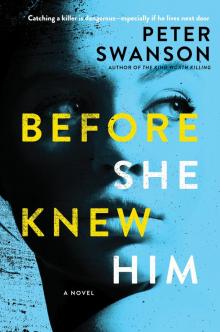 Before She Knew Him
Before She Knew Him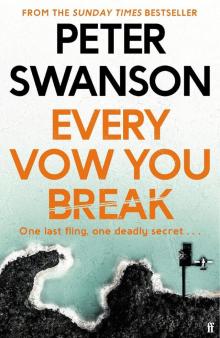 Every Vow You Break
Every Vow You Break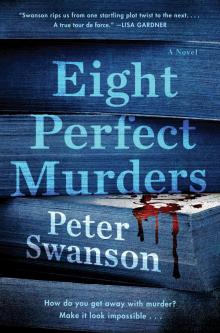 Eight Perfect Murders
Eight Perfect Murders Rules for Perfect Murders
Rules for Perfect Murders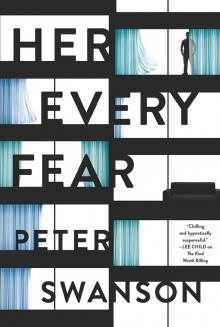 Her Every Fear
Her Every Fear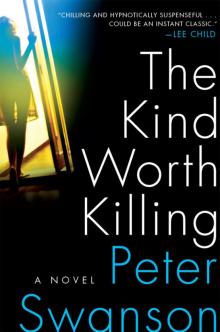 The Kind Worth Killing
The Kind Worth Killing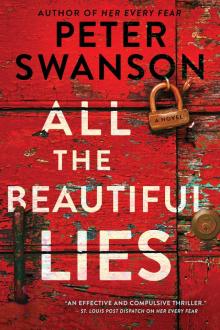 All the Beautiful Lies
All the Beautiful Lies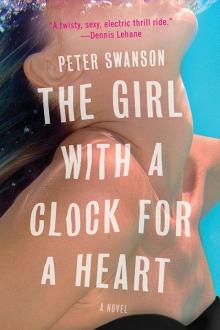 The Girl with a Clock for a Heart: A Novel
The Girl with a Clock for a Heart: A Novel